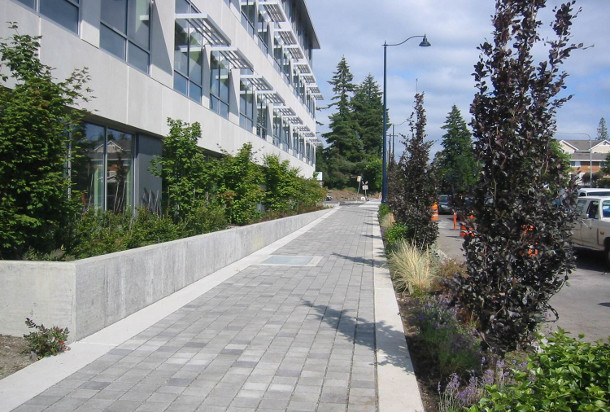
Permeable pavers were used over Silva Cells on a project along Aurora Avenue in Shoreline, WA. Image courtesy of Otak.
There are many advantages to using permeable pavers over Silva Cell installations. The two biggest are maximizing stormwater volume, rate, and quality benefits, and minimizing installation and maintenance labor requirements.
In today’s post, I’ll be discussing these two stormwater benefits (as well as a few extras!) in more detail.
Increase stormwater volume storage
The aggregate layer under permeable pavement provides additional stormwater storage. The aggregate reservoir under the permeable pavement and above the Silva Cell decks typically provides storage equal to 40 percent of the aggregate volume. According to the 2012 LID Technical Guidance Manual for Puget Sound, “Initial research indicates that properly designed and maintained permeable pavements can virtually eliminate surface flows for low to higher intensity storms common in the Pacific Northwest…A six year University of Washington permeable pavement demonstration project found that nearly all water infiltrated various test surfaces for all observed storms (Brattebo and Booth, 2003). Observed infiltration was high despite minimal maintenance conducted.”
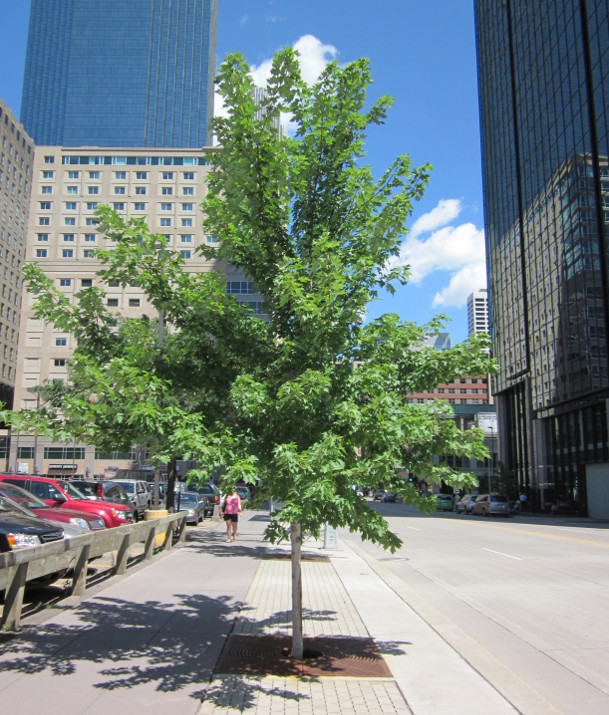
Pervious pavers were used in combination with concrete over Silva Cells along 48 blocks of downtown Minneapolis.
Improve water quality
Both trees and soil clean stormwater runoff, with high pollutant removal rates similar to those of more typical bioretention systems. Since permeable pavement also cleans runoff water, adding permeable pavement on top of a Silva Cell system improves water quality even more than Silva Cells with impervious paving.
If all water runoff from a site drains through the permeable pavement and no underdrains are used, 100% of pollutants are reduced. If underdrains are installed when permeable pavement is used over Silva Cells, there will rarely be any flow out the underdrains. Any runoff that does leave the site will be cleaner than runoff from a traditional pavement.
Research has found the following removal rates for runoff from permeable pavement underdrains:
- 89-98% lead removal (Dierkes et al, 2002 in 2012 LID Technical Guidance Manual for Puget Sound)
- 74-98% dissolved cadmium removal (Dierkes et al, 2002 in 2012 LID Technical Guidance Manual for Puget Sound)
- 89-96% dissolved copper removal (Dierkes et al, 2002 in 2012 LID Technical Guidance Manual for Puget Sound)
- 72-98% dissolved zinc removal (Dierkes et al, 2002 in 2012 LID Technical Guidance Manual for Puget Sound)
- 97.6% motor oil (Pratt et al, 1999 in 2012 LID Technical Guidance Manual for Puget Sound)
- 74% TSS removal – upper and lower 90% confidence bounds are 93% and 33%, respectively – (8 studies provided through correspondence with the Interlocking Concrete Pavement Institute (IPCI), in draft Minnesota Stormwater Manual Pervious Pavement Updates)
- 45% phosphorus removal – upper and lower 90% confidence bounds are 65% and 24%, respectively (7 studies provided through correspondence with ICPI, in draft Minnesota Stormwater Manual Pervious Pavement Updates)
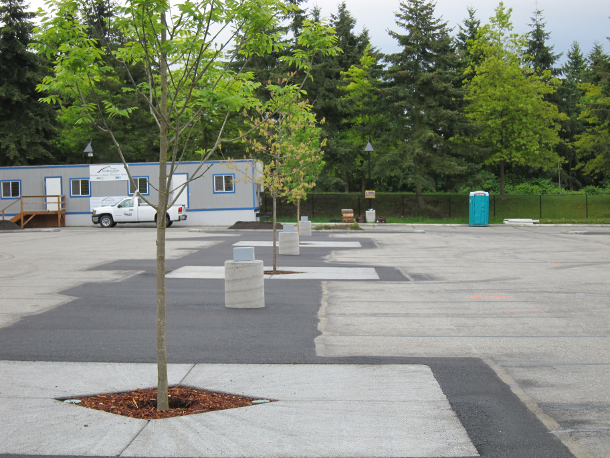
Pervious paving was used over Silva Cells in this parking lot project in Mountlake, WA
Reduce Installation and Maintenance Requirements
When Silva Cells are used for stormwater management, stormwater is generally directed to the system through either permeable pavers or distribution pipes. Permeable pavers eliminate the need to install and maintain (clean) distribution pipes. And since there are no distribution pipes, there is no chance of distribution pipes clogging.
In addition to all of these benefits, here are a few more advantages to using permeable pavers above Silva Cells include:
- Rainwater is more readily available to the tree
Rain that falls on permeable pavement above Silva Cells drains straight into the soil in the Silva Cells and becomes available for the tree to use. Rain that falls on impervious pavement cannot flow through the pavement into the soil below, so it will not become available to the tree.
- Reduced ice formation under frozen conditions
Research at the University of New Hampshire has shown that because permeable pavers drain so quickly, less ice forms – and therefore less salt is needed. Lower salt use benefits the trees, pavement, and water quality. According to the 2012 LID Technical Guidance Manual for Puget Sound, “Ice buildup on permeable pavement is reduced and the surface becomes free and clear more rapidly compared to conventional pavement. For Western Washington, deicing and sand application may be reduced or eliminated and the permeable pavement installation should be assessed during the winter months and the winter traction program developed from those observations.”
- Increased flow of rain through permeable pavement vs. impervious pavement flushes more de-icing salts out of the soil
Because much more rain flows through permeable pavement than through impervious pavement, de-icing salts are flushed out of soils under permeable pavement much better than from soils under impervious pavement. This minimizes the negative effects of salt on the soil and trees.
- Aesthetics
Permeable pavers just look really nice!
Despite all these advantages, we don’t see permeable pavers used on most Silva Cell projects. They are usually a more expensive option than traditional paving, which is no doubt part of the reason why they aren’t used more widely. Given all the design and sustainability advantages they present, though, we hope to see more of them going forward.
Nathalie Shanstrom is a landscape architect with The Kestrel Design Group. She specializes in sustainable design.


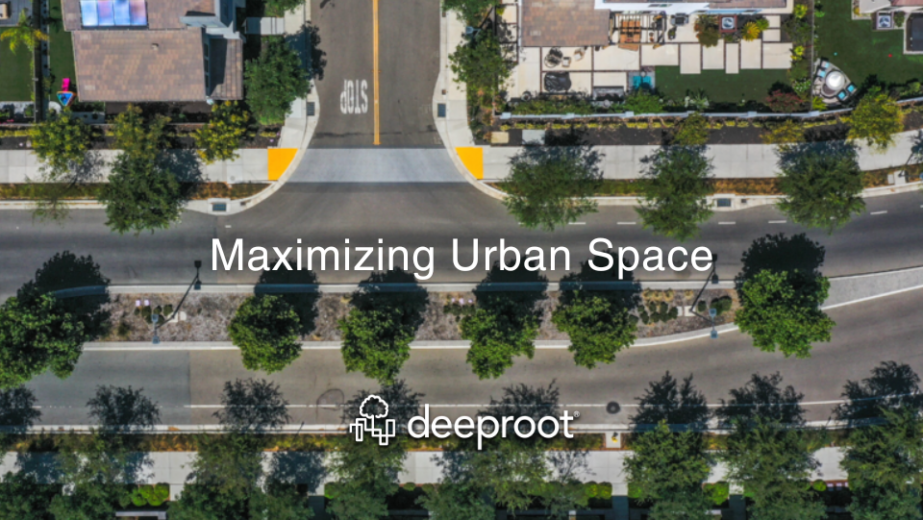
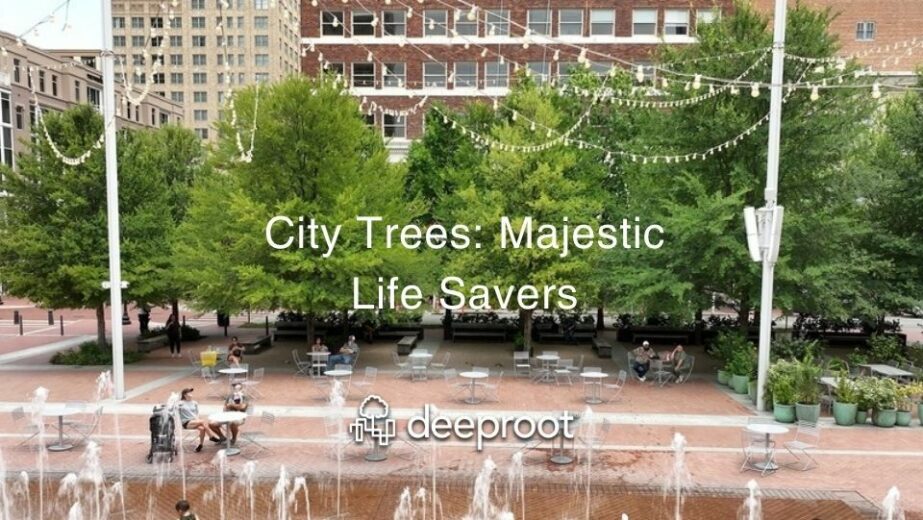
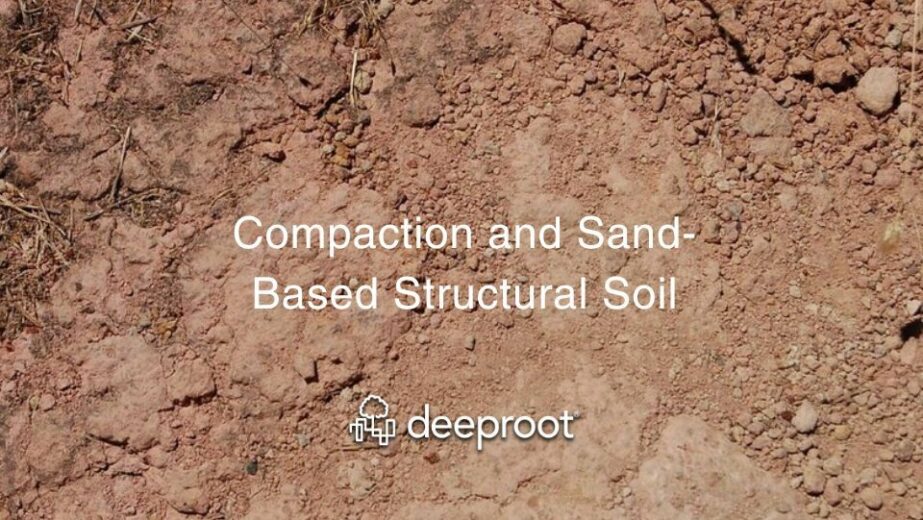

Great article. However, I recommend changing the title to “The Advantages of Permeable Pavers Installed Over Silva Cells” or something to that effect. I read half the article looking for the reasons why permeable pavers are more advantageous than Silva Cells…
Hah, I didn’t notice that when putting this post together. Thanks for the suggestion!